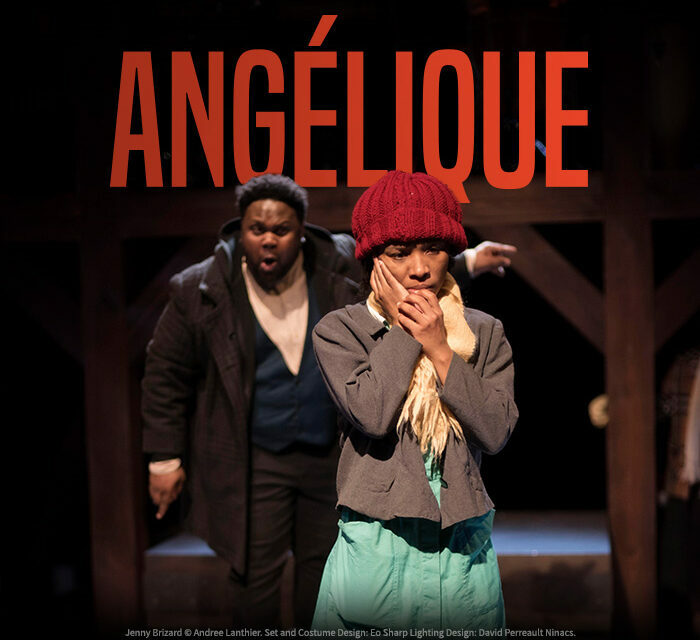Life will be different this time,” says young, hopeful Marie-Joseph Angélique at the beginning of Lorena Gale’s Angélique (NAC). A sinking feeling in your gut signals no, it won’t. Your gut is right.
And really, why should Angélique (Jenny Brizard) look to the future with any optimism? Brought from Portugal, she’s a black, domestic slave in a wealthy, 18th-century Montreal household, one of many over the two centuries before slavery was abolished across the British Empire in 1833 (Gale’s play is based on the real-life story of Marie-Joseph Angélique).
She doesn’t labor in cotton fields but she may as well. She toils endlessly. She’s sexually abused by her owner, the wealthy iron merchant François Poulin de Francheville (played with a blend of entitled hauteur and neediness by Karl Graboshas). She’s objectified by the mistress of the household, Thérèse de Couagne (France Rolland, tamped down until she’s not). She’s whipped when she appears to have transgressed, forced to have children with another slave, César (Omari Newton), and, in a reversal of the underground railroad story we Canadians pride ourselves on, desperately tries to run away to the U.S.
In the end, she’s tortured, hung and her body burned when she’s convicted, purely on hearsay, of having set a fire that burned 45 Montreal homes and the Hôtel-Dieu hospital.
You’d think all this would make compelling theatre. Like Angélique’s optimism, it doesn’t work out as planned.
Much of the fault lies in the script, which Gale, a Montreal-born actress, director, and playwright who died in 2009, created in the mid-’90s.
Determined to make clear that the systemic racism that doomed Angélique and others still flourishes, Gale resorts to exposition barely disguised as drama.
Clunky lines abound: “The truth will not be silent,” says Angélique at one point, a stilted reference to the silencing of other voices that is part and parcel of racism and marginalization in the past and the present. Elsewhere, Angelique’s white, Francophone boyfriend Claude (Olivier Lamarche) marvels at how snow all looks the same once it’s fallen on the ground but, in fact, each snowflake is unique. Okay, we get it.
The play also shifts awkwardly between then and now.
References to vacuum cleaners and a Mercedes-Benz mix uneasily with 18th-century industrialization and the buying and selling of slaves. People from long ago – including François’ business partner Ignace (Chip Chuipka) and another slave Manon (PJ Prudat) — use contemporary speech patterns, leaving you increasingly puzzled as to just when all these things are happening. Characters appear for part of the show in clothing from one century and then in clothing from another (since similar costuming was used in a late-1990s production, it’s a safe bet Gale wrote this into the script).
As a strategy for yoking past and present, this feels annoyingly contrived.
It also stands like a wall between our engagement and the brute ugliness of racism, marginalization, and erasure of identity that Gale is trying to convey. Angélique, played with a self-possessed spirit by Brizard, should elicit more than just our intellectual involvement; instead, buffeted by the play’s jarring structure, our empathy is continually blunted.
The whole thing makes you suspect that there are reasons Gale’s play, only one of two she published, seemingly vanished from sight after 1999 until resurrected by director Mike Payette and company in Montreal in 2017.
Thank goodness for the soundscape. It’s played by the Sixtrum Percussion Ensemble, who sits on a platform at the top of Eo Sharp’s wooden post-and-beam set. The ensemble’s work – their wonderful evocation of creaking ice on a river, for instance — lends resonance that the play otherwise lacks.
Angélique hoped for better things. This show about her isn’t one of them.
Angélique is a Black Theatre Workshop (Montreal) and Tableau D’Hôte Theatre (Montreal) co-production. In the Babs Asper Theatre until March 31. It was reviewed on Friday. Tickets and more information: NAC box office, Ticketmaster outlets, 1-888-991-2787, nac-cna.ca
First published on Artsfile.ca
This article appeared in Capital Critics Circle on March 24, 2019, and has been reposted with permission.
This post was written by the author in their personal capacity.The opinions expressed in this article are the author’s own and do not reflect the view of The Theatre Times, their staff or collaborators.
This post was written by Patrick Langston.
The views expressed here belong to the author and do not necessarily reflect our views and opinions.


















